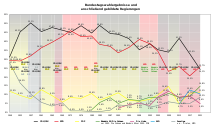

The German federal election aims to determine the members of the German Parliament (der Bundestag). It occurs every four years, according to Art. 39 of the German Constitution; this period can be shortened in the event of the dissolution of the Bundestag (Art.63 and Art.68) or extended during a state of emergency (Art.11h). The chosen day for the federal election is determined by the president (Bundespräsidenten) after consulting the federal government and the governments of the constitutive federal states.
The Federal Election Law, as defined by the Federal Election Act, is based on the principle of proportional representation with a fifty percent hurdle. The number of representatives is at least double the number of electoral ridings, the surplus existing via "Überhangmandate" und "Ausgleichsmandate". Currently, there is a minimum of 598 seats in the German Parliament.
The last German federal election took place in September 24, 2017. The next is scheduled for September 26, 2021.
| Graphs are unavailable due to technical issues. There is more info on Phabricator and on MediaWiki.org. |